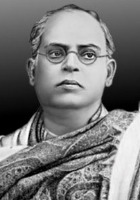Dwijendralal Ray
Dwijendralal Ray Biography
Dwijendralal Ray (Bengali: দ্বিজেন্দ্রলাল রায়), also known as D. L. Ray (Bengali: ডি. এল. রায়), was a Bengali poet, playwright, and musician. He was known for his Hindu mythological and Nationalist historical plays and songs known as Dwijendrageeti or the Songs of Dwijendralal, which number over 500, create a separate sub-genre of Bengali Music. Two of his most famous compositions are Dhana Dhanya Pushpa Bhara and Banga Amar Janani Amar. He is regarded as one of the most important figures in early modern Bengali literature. Early Life Dwijendralal Ray was born in Krishnanagar, Nadia, in modern-day Indian state of West Bengal, on July 19, 1863. He was the seventh child of Kartikeyachandra Ray, Dewan (Chief Officer) of Krishnanagar palace. His mother was a descendant of Vaishnava ascetic Advaita Acharya. Ray had six elder brothers and a younger sister. As a child, Ray was temperamental, introvert, thoughtful and a lover of nature although he had a gift of gab. He passed the Entrance Examination in 1878 and First Arts Examination in 1880 from Krishnanagar Collegiate School. Later he passed B.A. from Hooghly College and passed M.A. in English in 1884 from Presidency College, Calcutta, as a graduating student of the University of Calcutta. Being a brilliant student, he got scholarship in Entrance and First Arts and stood second in M.A. Aryagatha Part I, a collection of Ray’s songs written between twelve to seventeen years of age, was published his 1882. It was his first publication. In England In 1884, Ray got a state scholarship for study of agriculture in England. “His description of the sea-voyage and his keen observation on the manners, customs, food-habits and dresses of British people” was serialised in a weekly named Pataka and later published by his brothers as Bileter Patra (Letters from England). While in England, he received the news of his beloved parents’ death. In 1886, he published The Lyrics of Ind, a collection of English lyrical poems written in England. Ray Passed the examination from the Cirencester College and was enrolled as a member of the Royal Agricultural College and the Royal Agricultural Society. After obtaining a diploma in F.R.A.S., he returned to India in 1886. Career On his return from England, Ray was appointed as a Deputy Magistrate in 1886 and worked in the Departments of Survey and Settlement, Excise, Land Records and Agriculture, Administration and Judiciary in different parts of Bengal, Bihar and Central Province. In 1887, Ray married Surabala Devi, daughter of Pratap Chandra Majumdar, a renowned Homeopath physician. He was appointed the First Inspector of the Excise Department in 1894, the Assistant Director, Land Records and Agriculture Department in 1898 and the Assistant to the Commissioner, Excise Department in 1900. Later again he was appointed Inspector of Excise Department. Surabala Devi died in 1903. In 1905, Ray was transferred to Khulna. Later he served at Murshidabad, Kandi, Gaya and Jahanabad also. In 1908, he took long leave to stay in Calcutta. Next year, he was appointed Deputy Magistrate of 24 Parganas. In 1912, he was transferred to Bankura and within three months he was again transferred to Munger where he fallen seriously ill and due to this illness he took voluntary retirement and returned to Calcutta. Last Days In the same year, Ray started editing a journal named Bharatbarsha. But he did not live more than two months after his retirement. He died of a sudden attack of epilepsy on May 17, 1913. Political Activity Though from a landed Bengali aristocratic family, Ray was known for his pro-peasant sentiments. In 1890, while working for the government, he clashed with the Bengal Governor on the issue of peasant land rights and tithing obligations. Following the 1905 Partition of Bengal, Ray joined the cultural movement to reunite the two new Bengali provinces. It was during the time he wrote several patriotic songs that are still immensely popular today. He was known also for his commitment to the upliftment of women, and his strong stance against Hindu religious orthodoxy and ritual. His collection Hanshir Gaan was a satire against upper-caste Hindu dominance of religious practices. Legacy His Bengali nationalist anthem Dhana Dhanya Pushpa Bhara is immensely popular in both Bangladesh and India, and was reportedly considered a possible choice to become the national anthem of Bangladesh in 1971. Under the direction of Ruma Guha Thakurta, Calcutta Youth Choir performs his songs regularly in their concerts and they even have a few number of records with his songs. Many of his Bengali patriotic songs were regularly played on the Swadhin Bangla Betar Kendra, the clandestine radio station broadcast to revolutionaries and occupied population during the Bangladesh Liberation War.)
Dwijendralal Ray Comments
Bengal is the sky which is full of glowing stars, and one of the greatest glowing stars is Dijendralal Roy.

Mukto Benir Looking for this poem by Dwijendra Lal.Thanks